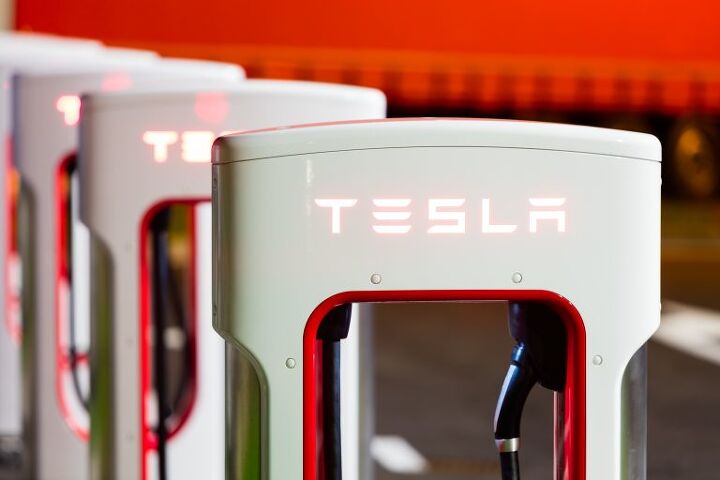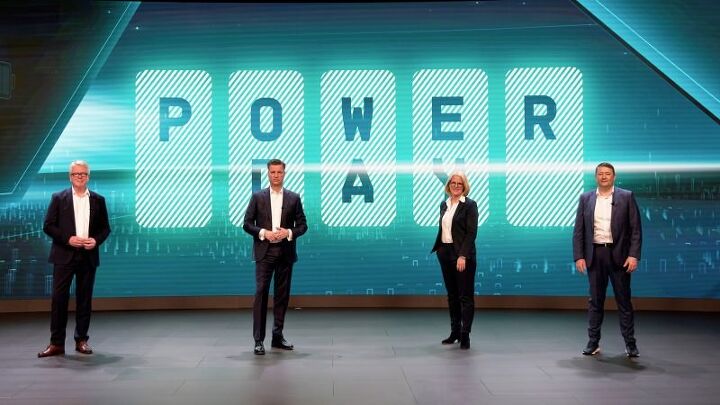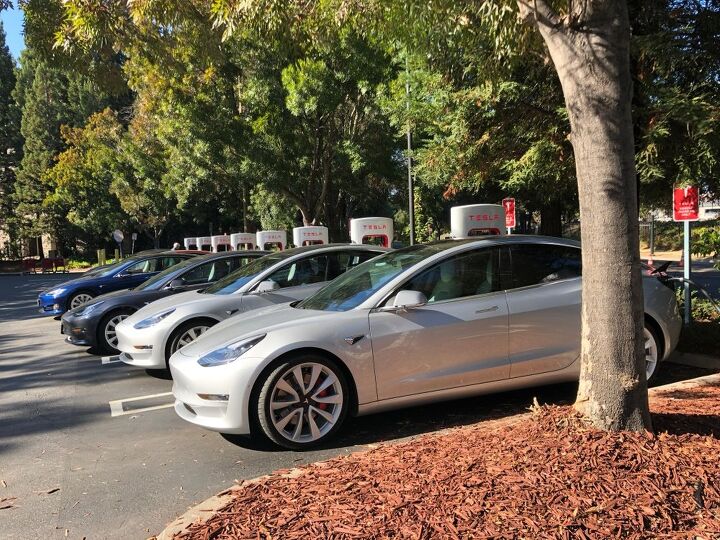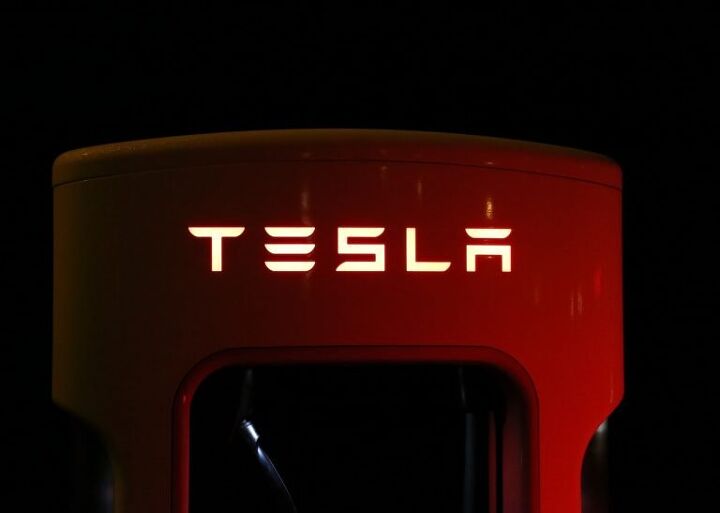#gigafactory
Tesla Heads South of the Border With Confirmed Mexico Gigafactory
Tesla just wrapped its annual Investor Day, where the automaker invites fans and shareholders to hear it brag about its accomplishments and future products. At yesterday’s event, Tesla confirmed the poorly-held secret that a Gigafactory is coming to Mexico.
Tesla Officially Moving to Texas, Elon Musk Confirms Austin HQ
Tesla CEO Elon Musk has officially announced that his company would be moving house this week. Currently nestled upon the bosom of Silicon Valley in Palo Alto, CA, the automaker has expressed its intent to establish a new base of operations in Austin, TX. While this situation has been a long time coming, it’s not quite the prompt walkout that everyone was predicting 17 months ago.
At the start of the pandemic, Musk found himself at odds with local officials pushing strict COVID lockdowns. The CEO had wanted to keep the all-important Fremont facility up and running at the start of 2020, suggesting workers could simply choose to stay home without there being any negative repercussions (or pay). Told again to shut down, Tesla sued Alameda County on the grounds that its orders were unconstitutional and violated a return-to-work mandate recently issued by Governor Gavin Newson. Before long, Elon Musk was openly confessing he was fed up with the state of California and would be relocating the business.
Place Your Bets: German Gigafactory Operational By October?
Tesla Gigafactory has been hit with more red tape than a last-minute Christmas present and is reportedly nearing completion. Elon Musk even suggested the facility could be producing vehicles by the end of October. However, some of the language emanating from his recent 0n-site engagement has us wondering what the odds are on that becoming a reality. The facility has already been delayed on more than one occasion by environmental activists and bureaucratic hang-ups. Though it now appears to be within a few weeks of commencing operations, Tesla’s CEO didn’t sound overly optimistic about the target.
On Friday, Musk met with Armin Laschet — Germany’s leading Conservative candidate to succeed Angela Merkel as chancellor — to tour the grounds of Gigafactory Berlin (technically Gruenheide). Though the main event was Elon’s preceding meeting with local Brandenburg officials that have not yet given final approval on the facility, citing ecological concerns.
Tesla Keeps Raising Prices for U.S. But Not China
This year has already seen price increases across the board, thanks largely to the supply crisis created in the wake of our response to the pandemic. As it turns out, shutting down the global economy wasn’t ideal for maintaining business as usual and nobody in charge seems all that interested in returning things to normal. Automotive prices have become particularly troublesome, as manufacturing costs have risen and a deficit of product has made this a seller’s market.
Tesla has been raising rates all year, particularly on its higher-volume models. By June, price bumps had become so common with the brand that CEO Elon Musk had to address the matter. He blamed industry-wide supply chain pressures, noting that raw materials had become particularly costly. While a totally rational explanation, there are problems with it when you realize those end-of-line price hikes aren’t being extended to China.
Tesla's German Factory Needs Help From Shanghai
Despite achieving a miraculous global expansion in a period where established industrial conglomerates and regulatory hurdles make it nearly impossible for new automakers to persist, Tesla’s German facility is running behind schedule. Production at the Gruenheide plant (aka Giga Berlin or Gigafactory 4) was originally planned to commence this month, with deliveries kicking off shortly thereafter. But those targets have been shifted closer to the end of this year or the more likely scenario of early 2022.
As Tesla would still like to supply the market, its facility in Shanghai will begin shipping vehicles to Europe in August until local production can be achieved. Model Y crossovers will be imported from China until its German site has its assembly lines humming, which has turned out to be a harder task than the automaker anticipated.
Stop Copying Me: Is Elon Musk the New Steve Jobs?
The level of influence Elon Musk has is truly staggering, though not entirely without precedent. Steve Jobs was similarly famous and his whimsical marketing style ended up being so effective that you would see doppelgangers embracing his tactic of selling people an experience, rather than focusing wholly on the product. Minus the black turtleneck, some might even argue Musk has aped his style — perhaps while noticing similar sales tactics embraced by Ron Popeil, David Ogilvy, or P.T. Barnum.
A good pitchman is one that can adapt tried-and-true methods from their forebears while having enough unique flare not to come across as derivative. But not everyone has the magic and we’re left with a sea of less enduring (and endearing) copycats. Notice how practically every electric vehicle manufacturer seems hellbent on becoming the next Tesla, rather than adopting a corporate personality of their own.
Teutonic Tesla: Volkswagen Now Building 'Gigafactories'
As much as we’ve criticized American luxury brands for emulating the Germans, we’ve failed to do the same for Volkswagen Group’s pathetic attempts at copying Tesla. That changes with Monday’s announcement that VW will assemble six “gigafactories” in Europe by 2030. Shared on “Power Day” — the company’s bastardized version of Tesla’s Battery Day — the plan is supposed to result in a production capacity of 240 GWh annually when completed and help VW reduce battery costs while also securing access.
It’s not a half-bad plan for a company entirely devoted to electrification, which is probably why Tesla follows a similar model using nearly identical terminology. Though, considering the absolute mess Volkswagen seems to have made of its EV transmission thus far, some might find it difficult to blame the automaker for looking at the competition and breaking out the notepad.
Others will be less sympathetic while acknowledging this is probably VW’s best play if it’s serious about EVs.
Tesla's Gambit: Secretive Battery Project Launched in Texas
When it comes to automakers jumping into electrification, nobody does it like Tesla. Its complete reliance on the success of battery-electric vehicles has encouraged it to make the kind of big moves that cause trepidation in traditional manufacturers. While other companies were debating how many EVs they should target years down the road, Tesla was building the proprietary charging network that actually helped those vehicles make sense to consumers.
Now, it’s using a new subsidiary to place another piece of the puzzle directly into Texas’ energy grid. Gambit Energy Storage is reportedly building a 100-megawatt energy hub in Angleton, following widespread outages in the greater Houston area. While it’s known that Tesla has started shifting operations to The Lonestar State after CEO Elon Musk announced he had enough of California at the start of 2020, the Gambit project is not something the automaker has decided to advertise — even though it seems to play favorably into its long-term strategy.
Elon Musk Says EVs Will Double World's Need for Electricity
While electric automobiles have numerous advantages over internal combustion vehicles, we’ve often wondered when their disadvantages would be offset to a point that would make sense to have them become the dominant mode of transportation. While there are multiple issues that have to be addressed, one of the largest involves finding a way to source the kind of energy needed for the world to recharge them on a regular basis.
An EV-dominated society likely means elevated energy prices and peak demand hours that could easily overtax national energy grids. Renewable energy sources may also prove insufficient in providing the kind of power necessary — potentially requiring countries to double down on plants reliant on coal, oil, and natural gas if nuclear facilities are not approved. Counter-productive takes like that are often downplayed, however, so industrial giants can continue proclaiming the technology as largely trouble-free.
But what happens when EV royalty starts making similar claims about our collective energy needs?
Tesla Looks to German Acquisition to Increase Battery Production Capabilities
Tesla continues their aggressive plans for dominance in the EV market. As we reported last week, the company has ambitious plans to enter the Indian market next year. While that market will certainly require a cheaper model than what the company sells now, Tesla’s on it. The brand intends to drive toward EV adoption with better, longer-lasting batteries and less expensive models.
And on Friday, word leaked of a deal over in Germany that’s an important part of Tesla’s expansion plan.
Tesla to Reduce Gigafactory Staff by 75 Percent
With Panasonic having already made plans to ramp down production at the Nevada battery facility it shares with Tesla, followed by a 14-day closure to curtail the spread of the new coronavirus, its business partner has decided to follow suit. Tesla now plans on reducing on-site staff at Gigafactory 1 by 75 percent, according to the local county manager Austin Osborne.
“Tesla has informed us that the Gigafactory in Storey County is reducing on-site staff by roughly 75 [percent] in the coming days,” he explained via the county’s website on Thursday. “Our companies at [Tahoe Reno Industrial Center] TRIC are taking the COVID-19 matter seriously, and regularly report to us the measures they are taking to adhere to the established guidelines while maintaining essential operations. Checking employee temperatures, creating central access, allowing remote work, maintaining workstation distance, and others are occurring.”
Tesla's German Factory Could Be Delayed So Animals Can Hook Up
Tesla’s planned factory in Germany could face major delays if the manufacturer doesn’t start construction within the next two months. Brandenburg’s Economy Minister, Joerg Steinbach, recently told German outlet Handelsblatt that the 300-hectare area in Grünheide Tesla set aside is subject to environmental regulations that prohibit interfering with the local wildlife’s breeding habits.
These twitterpated critters are not to be interfered with if the company hasn’t started building by mid-March.
Until then, it’s fair game. Once crews finish clearing the land (and leftover ordnance from World War II), they can finish scaring away the animals. However, if Tesla can’t get all of that done in a couple of months and start construction on the factory, it will be forced to delay the entire project another nine months.
Green Clash: German Environmentalists Protest Tesla Factory
The catapulting of environmental issues to the forefront of public discourse has spawned many unlikely clashes between greens of different stripes. Climate protesters against CO2-free nuclear power generation, eco types versus high-speed electric rail, and now, angry Germans demanding Tesla stop stealing its water.
The electric automaker’s attempt to build a massive factory in the European country has hit a social roadblock.
Report: Tesla's Battery Partner Grows Wary, Freezes Spending
Tesla’s lackluster first-quarter deliveries report did more than spook analysts and investors — it also provided the rationale for Panasonic to reevaluate its relationship with the automaker. Japan’s Nikkei Asian Review reports that the battery maker, which partnered with Tesla on the automaker’s Nevada Gigafactory 1, has grown cold feet.
The publication reports the two companies have frozen spending on the Nevada plant, culling plans for an expansion of battery production. Not only that, Panasonic has decided not to invest in Tesla’s Shanghai vehicle/battery production facility.
Sex, Drugs, and Electric Cars: Report Claims Elon Musk Tried to 'Destroy' Whistleblower, Spied on Union Meetings
A recent report from Bloomberg frames Tesla CEO Elon Musk as quite the jerk in relation to his actions toward a former employee. This worker is the whistleblower who, last year, shared internal documents that suggested the company’s Nevada Gigafactory was blowing through raw materials at an alarming rate. Martin Tripp offered up information showing Tesla wasted $150 million in materials and accused the automaker of pursuing unsafe production procedures during its push to increase Model 3 volume.
Tripp, who tried briefly to maintain his anonymity, said he was concerned that Tesla was shipping cars that were potentially dangerous to consumers. However, Tesla quickly responded by suggesting the claims against it were ridiculous and the amount of waste cited in the report was an overstatement.
“As is expected with any new manufacturing process, we had high scrap rates earlier in the Model 3 ramp. This is something we planned for and is a normal part of a production ramp,” Tesla told Business Insider in 2018.
Following an intense Twitter rant from Elon Musk, the story died down. But the corporate task force charged with finding out who leaked the information would eventually lead to even more ridiculous claims.




























Recent Comments